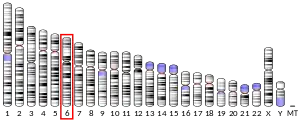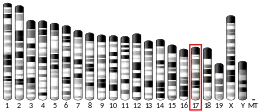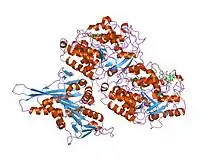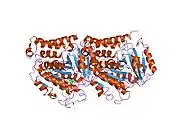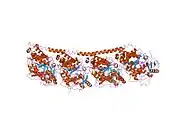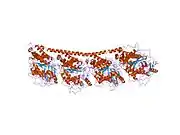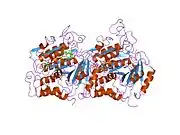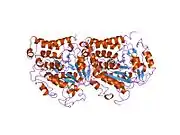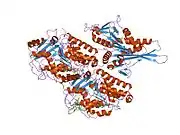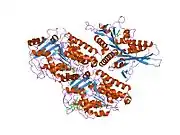TUBB
Tubulin beta chain is a protein that in humans is encoded by the TUBB gene.[5][6][7]
See also
References
- ENSG00000232421, ENSG00000183311, ENSG00000224156, ENSG00000235067, ENSG00000232575, ENSG00000227739, ENSG00000229684 GRCh38: Ensembl release 89: ENSG00000196230, ENSG00000232421, ENSG00000183311, ENSG00000224156, ENSG00000235067, ENSG00000232575, ENSG00000227739, ENSG00000229684 - Ensembl, May 2017
- GRCm38: Ensembl release 89: ENSMUSG00000001525 - Ensembl, May 2017
- "Human PubMed Reference:". National Center for Biotechnology Information, U.S. National Library of Medicine.
- "Mouse PubMed Reference:". National Center for Biotechnology Information, U.S. National Library of Medicine.
- Crabtree DV, Ojima I, Geng X, Adler AJ (Aug 2001). "Tubulins in the primate retina: evidence that xanthophylls may be endogenous ligands for the paclitaxel-binding site". Bioorganic & Medicinal Chemistry. 9 (8): 1967–76. doi:10.1016/S0968-0896(01)00103-1. PMID 11504633.
- Volz A, Weiss E, Trowsdale J, Ziegler A (Jan 1994). "Presence of an expressed beta-tubulin gene (TUBB) in the HLA class I region may provide the genetic basis for HLA-linked microtubule dysfunction". Human Genetics. 93 (1): 42–6. doi:10.1007/BF00218911. PMID 8270253. S2CID 7853030.
- "Entrez Gene: TUBB tubulin, beta".
- Goo YH, Sohn YC, Kim DH, Kim SW, Kang MJ, Jung DJ, Kwak E, Barlev NA, Berger SL, Chow VT, Roeder RG, Azorsa DO, Meltzer PS, Suh PG, Song EJ, Lee KJ, Lee YC, Lee JW (Jan 2003). "Activating signal cointegrator 2 belongs to a novel steady-state complex that contains a subset of trithorax group proteins". Molecular and Cellular Biology. 23 (1): 140–9. doi:10.1128/MCB.23.1.140-149.2003. PMC 140670. PMID 12482968.
- Haberman Y, Grimberg E, Fukuda M, Sagi-Eisenberg R (Nov 2003). "Synaptotagmin IX, a possible linker between the perinuclear endocytic recycling compartment and the microtubules". Journal of Cell Science. 116 (Pt 21): 4307–18. doi:10.1242/jcs.00719. PMID 12966166.
Further reading
- Berrieman HK, Lind MJ, Cawkwell L (Mar 2004). "Do beta-tubulin mutations have a role in resistance to chemotherapy?". The Lancet. Oncology. 5 (3): 158–64. doi:10.1016/S1470-2045(04)01411-1. PMID 15003198.
- Horisberger MA (Aug 1992). "Interferon-induced human protein MxA is a GTPase which binds transiently to cellular proteins". Journal of Virology. 66 (8): 4705–9. doi:10.1128/JVI.66.8.4705-4709.1992. PMC 241296. PMID 1629950.
- Wang D, Villasante A, Lewis SA, Cowan NJ (Nov 1986). "The mammalian beta-tubulin repertoire: hematopoietic expression of a novel, heterologous beta-tubulin isotype". The Journal of Cell Biology. 103 (5): 1903–10. doi:10.1083/jcb.103.5.1903. PMC 2114403. PMID 3782288.
- Lee MG, Lewis SA, Wilde CD, Cowan NJ (Jun 1983). "Evolutionary history of a multigene family: an expressed human beta-tubulin gene and three processed pseudogenes". Cell. 33 (2): 477–87. doi:10.1016/0092-8674(83)90429-4. PMID 6688039.
- Hall JL, Dudley L, Dobner PR, Lewis SA, Cowan NJ (May 1983). "Identification of two human beta-tubulin isotypes". Molecular and Cellular Biology. 3 (5): 854–62. doi:10.1128/mcb.3.5.854. PMC 368608. PMID 6865944.
- Andersson B, Wentland MA, Ricafrente JY, Liu W, Gibbs RA (Apr 1996). "A "double adaptor" method for improved shotgun library construction". Analytical Biochemistry. 236 (1): 107–13. doi:10.1006/abio.1996.0138. PMID 8619474.
- Yu W, Andersson B, Worley KC, Muzny DM, Ding Y, Liu W, Ricafrente JY, Wentland MA, Lennon G, Gibbs RA (Apr 1997). "Large-scale concatenation cDNA sequencing". Genome Research. 7 (4): 353–8. doi:10.1101/gr.7.4.353. PMC 139146. PMID 9110174.
- Kinnunen T, Kaksonen M, Saarinen J, Kalkkinen N, Peng HB, Rauvala H (Apr 1998). "Cortactin-Src kinase signaling pathway is involved in N-syndecan-dependent neurite outgrowth". The Journal of Biological Chemistry. 273 (17): 10702–8. doi:10.1074/jbc.273.17.10702. PMID 9553134.
- Niethammer M, Valtschanoff JG, Kapoor TM, Allison DW, Weinberg RJ, Craig AM, Sheng M (Apr 1998). "CRIPT, a novel postsynaptic protein that binds to the third PDZ domain of PSD-95/SAP90". Neuron. 20 (4): 693–707. doi:10.1016/S0896-6273(00)81009-0. PMID 9581762. S2CID 16068361.
- Rasmussen RK, Ji H, Eddes JS, Moritz RL, Reid GE, Simpson RJ, Dorow DS (May 1998). "Two-dimensional electrophoretic analysis of mixed lineage kinase 2 N-terminal domain binding proteins". Electrophoresis. 19 (5): 809–17. doi:10.1002/elps.1150190535. PMID 9629920. S2CID 21204230.
- Ciruela F, Robbins MJ, Willis AC, McIlhinney RA (Jan 1999). "Interactions of the C terminus of metabotropic glutamate receptor type 1alpha with rat brain proteins: evidence for a direct interaction with tubulin". Journal of Neurochemistry. 72 (1): 346–54. doi:10.1046/j.1471-4159.1999.0720346.x. PMID 9886087. S2CID 3923065.
- Chau MF, Radeke MJ, de Inés C, Barasoain I, Kohlstaedt LA, Feinstein SC (Dec 1998). "The microtubule-associated protein tau cross-links to two distinct sites on each alpha and beta tubulin monomer via separate domains". Biochemistry. 37 (51): 17692–703. doi:10.1021/bi9812118. PMID 9922135.
- Piredda L, Farrace MG, Lo Bello M, Malorni W, Melino G, Petruzzelli R, Piacentini M (Feb 1999). "Identification of 'tissue' transglutaminase binding proteins in neural cells committed to apoptosis". FASEB Journal. 13 (2): 355–64. doi:10.1096/fasebj.13.2.355. PMID 9973324. S2CID 16417170.
- Feng Y, Hodge DR, Palmieri G, Chase DL, Longo DL, Ferris DK (Apr 1999). "Association of polo-like kinase with alpha-, beta- and gamma-tubulins in a stable complex". The Biochemical Journal. 339 (2): 435–42. doi:10.1042/0264-6021:3390435. PMC 1220175. PMID 10191277.
- Martín L, Fanarraga ML, Aloria K, Zabala JC (Mar 2000). "Tubulin folding cofactor D is a microtubule destabilizing protein". FEBS Letters. 470 (1): 93–5. doi:10.1016/S0014-5793(00)01293-X. PMID 10722852. S2CID 35012741.
- Tarazona R, López-Lluch G, Galiani MD, Aguado E, Barahona F, Solana R, Peña J (Dec 2000). "HLA-B2702 (77-83/83-77) peptide binds to beta-tubulin on human NK cells and blocks their cytotoxic capacity". Journal of Immunology. 165 (12): 6776–82. doi:10.4049/jimmunol.165.12.6776. PMID 11120798.
- Bonnet C, Boucher D, Lazereg S, Pedrotti B, Islam K, Denoulet P, Larcher JC (Apr 2001). "Differential binding regulation of microtubule-associated proteins MAP1A, MAP1B, and MAP2 by tubulin polyglutamylation". The Journal of Biological Chemistry. 276 (16): 12839–48. doi:10.1074/jbc.M011380200. PMID 11278895.
- Ivings L, Pennington SR, Jenkins R, Weiss JL, Burgoyne RD (May 2002). "Identification of Ca2+-dependent binding partners for the neuronal calcium sensor protein neurocalcin delta: interaction with actin, clathrin and tubulin". The Biochemical Journal. 363 (Pt 3): 599–608. doi:10.1042/0264-6021:3630599. PMC 1222513. PMID 11964161.
This article is issued from Wikipedia. The text is licensed under Creative Commons - Attribution - Sharealike. Additional terms may apply for the media files.

